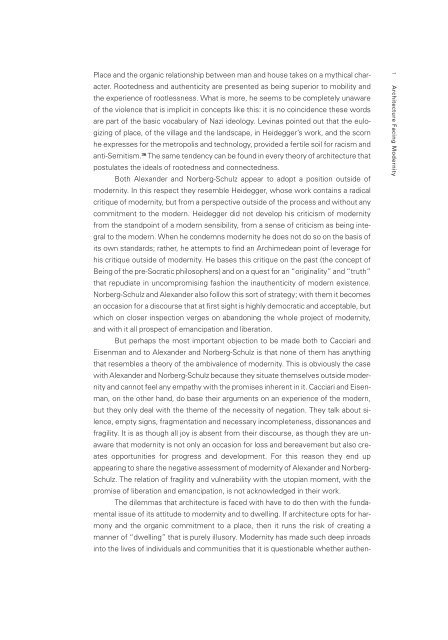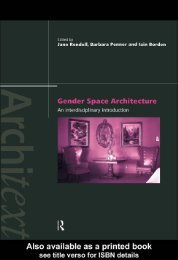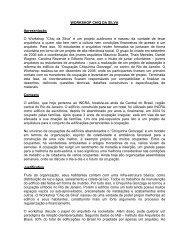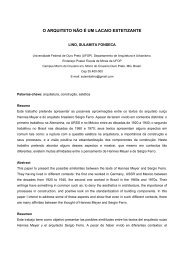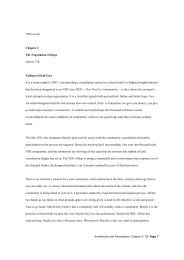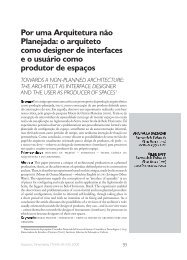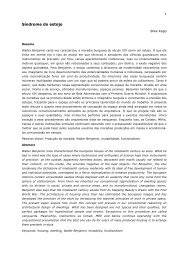Architecture and Modernity : A Critique
Architecture and Modernity : A Critique
Architecture and Modernity : A Critique
Create successful ePaper yourself
Turn your PDF publications into a flip-book with our unique Google optimized e-Paper software.
Place <strong>and</strong> the organic relationship between man <strong>and</strong> house takes on a mythical character.<br />
Rootedness <strong>and</strong> authenticity are presented as being superior to mobility <strong>and</strong><br />
the experience of rootlessness. What is more, he seems to be completely unaware<br />
of the violence that is implicit in concepts like this: it is no coincidence these words<br />
are part of the basic vocabulary of Nazi ideology. Levinas pointed out that the eulogizing<br />
of place, of the village <strong>and</strong> the l<strong>and</strong>scape, in Heidegger’s work, <strong>and</strong> the scorn<br />
he expresses for the metropolis <strong>and</strong> technology, provided a fertile soil for racism <strong>and</strong><br />
anti-Semitism. 36 The same tendency can be found in every theory of architecture that<br />
postulates the ideals of rootedness <strong>and</strong> connectedness.<br />
Both Alex<strong>and</strong>er <strong>and</strong> Norberg-Schulz appear to adopt a position outside of<br />
modernity. In this respect they resemble Heidegger, whose work contains a radical<br />
critique of modernity, but from a perspective outside of the process <strong>and</strong> without any<br />
commitment to the modern. Heidegger did not develop his criticism of modernity<br />
from the st<strong>and</strong>point of a modern sensibility, from a sense of criticism as being integral<br />
to the modern. When he condemns modernity he does not do so on the basis of<br />
its own st<strong>and</strong>ards; rather, he attempts to find an Archimedean point of leverage for<br />
his critique outside of modernity. He bases this critique on the past (the concept of<br />
Being of the pre-Socratic philosophers) <strong>and</strong> on a quest for an “originality” <strong>and</strong> “truth”<br />
that repudiate in uncompromising fashion the inauthenticity of modern existence.<br />
Norberg-Schulz <strong>and</strong> Alex<strong>and</strong>er also follow this sort of strategy; with them it becomes<br />
an occasion for a discourse that at first sight is highly democratic <strong>and</strong> acceptable, but<br />
which on closer inspection verges on ab<strong>and</strong>oning the whole project of modernity,<br />
<strong>and</strong> with it all prospect of emancipation <strong>and</strong> liberation.<br />
But perhaps the most important objection to be made both to Cacciari <strong>and</strong><br />
Eisenman <strong>and</strong> to Alex<strong>and</strong>er <strong>and</strong> Norberg-Schulz is that none of them has anything<br />
that resembles a theory of the ambivalence of modernity. This is obviously the case<br />
with Alex<strong>and</strong>er <strong>and</strong> Norberg-Schulz because they situate themselves outside modernity<br />
<strong>and</strong> cannot feel any empathy with the promises inherent in it. Cacciari <strong>and</strong> Eisenman,<br />
on the other h<strong>and</strong>, do base their arguments on an experience of the modern,<br />
but they only deal with the theme of the necessity of negation. They talk about silence,<br />
empty signs, fragmentation <strong>and</strong> necessary incompleteness, dissonances <strong>and</strong><br />
fragility. It is as though all joy is absent from their discourse, as though they are unaware<br />
that modernity is not only an occasion for loss <strong>and</strong> bereavement but also creates<br />
opportunities for progress <strong>and</strong> development. For this reason they end up<br />
appearing to share the negative assessment of modernity of Alex<strong>and</strong>er <strong>and</strong> Norberg-<br />
Schulz. The relation of fragility <strong>and</strong> vulnerability with the utopian moment, with the<br />
promise of liberation <strong>and</strong> emancipation, is not acknowledged in their work.<br />
The dilemmas that architecture is faced with have to do then with the fundamental<br />
issue of its attitude to modernity <strong>and</strong> to dwelling. If architecture opts for harmony<br />
<strong>and</strong> the organic commitment to a place, then it runs the risk of creating a<br />
manner of “dwelling” that is purely illusory. <strong>Modernity</strong> has made such deep inroads<br />
into the lives of individuals <strong>and</strong> communities that it is questionable whether authen-<br />
1 <strong>Architecture</strong> Facing <strong>Modernity</strong>


